© 2013 The Texas Lawbook.
By Patricia Baldwin
Lifestyle Writer for The Texas Lawbook
AUSTIN (April 24) – The Texas Access to Justice Commission and the State Bar of Texas designated Tuesday’s event as a “gala.” After all, raising more than $338,000 to help Texas veterans obtain legal aid calls for celebration.
Yet no single word is adequate to describe the evening at Austin’s AT&T Executive Education & Conference Center that showcased the commitment and generosity of the Texas legal community in serving the under-served.
The Champions of Justice Gala Benefiting Veterans featured boldface names, deserving awardees, poignant stories, inspiring speeches and staggering statistics. Lawyers wore their hearts on their sleeves. The dog wore a tux. (More on that later.)
The Supreme Court of Texas attended in force, with Justice Nathan Hecht presiding over the ceremonies. As the Court’s liaison for access to justice issues, Justice Hecht noted that the Supreme Court created the Commission in 2001 to increase financial and pro bono resources for legal aid for veterans, persons with disabilities, children, the elderly and victims of natural disasters.
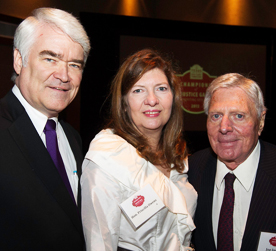
The aggregate numbers are staggering. More than 5.7 million Texans qualify for civil legal aid, but only 20 percent of the legal needs are met by existing legal aid programs. Yet through the power of one – individuals making a difference – the Texas Access to Justice Commission is increasing resources that help 100,000 Texas families each year with their civil legal needs.
In particular, Justice Hecht said legal aid helps low-income veterans obtain health benefits they deserve for injuries incurred during military service. In its fifth year, the gala has raised a total of $1.3 million. Major sponsors of this year’s event included AT&T Inc., Exxon Mobil Corp., Fulbright & Jaworski, Jamail & Kolius, Locke Lord, Provost Umphrey Law Firm and Vinson & Elkins.
“Pro bono work is both a professional obligation and a rewarding experience,” said V&E partner and current Commission chair Harry Reasoner. “You learn about human beings.”
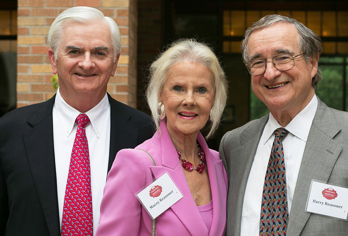
Reasoner also has learned that pro bono is good business. During his tenure as V&E managing partner, Reasoner instituted a policy that counted pro bono hours worked as billable hours when evaluating its lawyers. His goal is to have each V&E attorney post 50 pro bono hours annually. He also has encouraged law school deans to incorporate the pro bono process into curriculum.
Reasoner’s sentiments were echoed throughout the evening by the 360 attendees and two guest speakers.
Wayne Watts, AT&T general counsel and a co-chair for the gala, described corporate responsibility as “part of our DNA.”
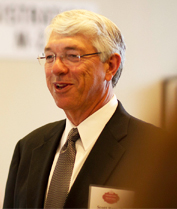
Still, legendary Houston attorney Joe Jamail of Jamail & Kolius, a co-chair for the gala, urged the State Bar to do more. “Poor people need help. The name of the Commission says it – access to justice.”
Guest speaker Paul Melton asked the audience to encourage their colleagues to give their time. “It doesn’t have to complicated,” said the president of the board of directors for the Department of Texas Veterans of Foreign Wars Foundation. He noted that some pro bono clients can be “confounded” by a simple lease agreement.
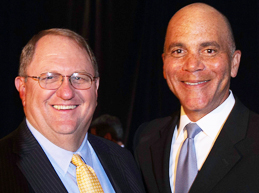
The Commission honored Stewart Gagnon with the Emily C. Jones Lifetime Achievement Award and James Harrington with the James B. Sales Boots on the Ground Award.
In presenting the awards, Chief Justice Wallace Jefferson of the Supreme Court of Texas, said, “You can tell about someone’s character by what they do.”
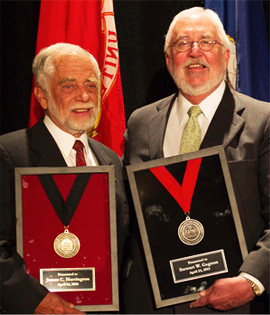
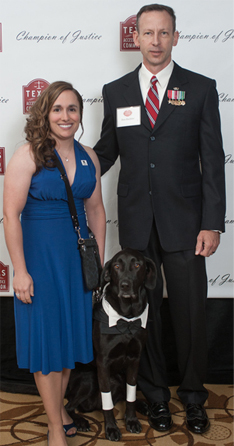
Finally…the dog. Donna Bachler with the Wounded Warrior Project was accompanied to the gala by “Grapefruit,” her Great Dane-Black Lab-Golden Retriever-mix service dog, who was dressed for the occasion in a tux and, of course, tail.
Do you have a special avocation, hobby or other lifestyle interest to share? Please email patricia.baldwin@texaslawbook.net.
© 2013 The Texas Lawbook. Content of The Texas Lawbook is controlled and protected by specific licensing agreements with our subscribers and under federal copyright laws. Any distribution of this content without the consent of The Texas Lawbook is prohibited.
If you see any inaccuracy in any article in The Texas Lawbook, please contact us. Our goal is content that is 100% true and accurate. Thank you.
